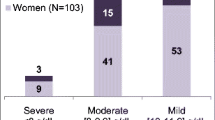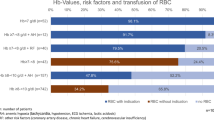Abstract
Introduction
The purpose of this French survey was to evaluate the adherence to the guidelines (European Organisation for Research and Treatment of Cancer [EORTC]; American Society of Clinical Oncology [ASCO]; French Standards, Options, and Recommendations [SOR]; European Society of Medical Oncology [ESMO]; Food and Drug Administration [FDA]; and National Comprehensive Cancer Network [NCCN]) for the use of erythropoiesis-stimulating agents (ESAs) in the management of chemotherapy-induced anemia for patients with advanced breast and lung cancers.
Methods
Two-hundred patients were recruited for each malignancy. The collected items were characteristics of ESA initiation, treatment, adjustment, and discontinuation. Metastatic breast cancer and stage IIIb/IV lung cancer patients who had received chemotherapy were eligible. The endpoint was to compare French daily practices with national and international guidelines.
Results
From November 2010 to December 2010, 185 breast cancer and 227 lung cancer files were collected. The main reason of ESA initiation was the correction of anemia (49% and 44%, respectively). The median baseline value of hemoglobin was 9.5 g/dL, and the median target value was 12 g/dL. The mean duration of treatment was 12 and 14 weeks, respectively. The mean gain of hemoglobin was 2.3 g/dL and 1.9 g/dL, respectively. In the breast cancer population, two patients (1%) developed a thromboembolic event, which is lower than what has been described in the literature. An iron supplement was prescribed in 55% of patients with breast cancer and 49% of those with lung cancer, with about one-third administered intravenous iron. The interruption of ESA and chemotherapy was synchronous in about 20% of cases, and was earlier in lung cancer patients than in breast cancer patients.
Conclusion
The quality and the rigor of the sampling represent one of the key points of this survey. The French and international guidelines for the use of ESA were well respected by the physicians. Overall, the management of chemotherapy-induced anemia was improved compared with what was described in the historical surveys (European Cancer Anaemia Survey [ECAS], French Anaemia Cancer Treatment [F-ACT]).
Similar content being viewed by others
References
Aapro MS, Link H. September s007 update on EORTC guidelines and anemia management with erythropoiesis-stimulating agents. Oncologist. 2008;13:33–36.
Miller CB, Jones RJ, Piantadosi S, Abeloff MD, Spivak JL. Decreased erythropoietin response in patients with the anemia of cancer. N Engl J Med. 1990;322:1689–1692.
Ludwig H, Van Belle S, Barrett-Lee P, et al. The European Cancer Anaemia Survey (ECAS): a large, multinational, prospective survey defining the prevalence, incidence, and treatment of anaemia in cancer patients. Eur J Cancer. 2004;40:2293–2306.
Kosmidis P, Krzakowski M. Anemia profiles in patients with lung cancer: what have we learned from the European Cancer Anaemia Survey (ECAS)? Lung Cancer. 2005;50:401–412.
Barrett-Lee P, Bokemeyer C, Gascón P, et al. Management of cancer-related anemia in patients with breast or gynecologic cancer: new insights based on results from the European Cancer Anemia Survey. Oncologist. 2005;10:743–757.
Caro JJ, Salas M, Ward A, Goss G. Anemia as an independent prognostic factor for survival in patients with cancer: a systemic, quantitative review. Cancer. 2001;91:2214–2221.
Guardiola E, Morschhauser F, Zambrowski JJ, Antoine EC. Management of anaemia in patient with cancer: results of the F-ACT study (French Anaemia Cancer Treatment). [In French]. Bull Cancer. 2007;94:907–914.
Rizzo JD, Brouwers M, Hurley P, et al. American Society of Clinical Oncology/American Society of Hematology clinical practice guideline update on the use of epoetin and darbepoetin in adult patients with cancer. J Clin Oncol. 2010;28:4996–5010.
Ray-Coquard I, Kassab-Chahmi D, Casadevall N, et al. Standards, Options, and Recommendations 2007. Indication des agents stimulant l’érythropoèse (ASE: époétine alpha, époétine bêta et darbépoétine) dans la prise en charge de l’anémie en cancérologie (mise à jour), rapport abrégé. Bull Cancer. 2008;95:433–441.
Scrijvers D, Roila F. Erythropoiesis-stimulating agents in cancer patients: ESMO recommendations for use. Ann Oncol. 2009;20(suppl. 4):159–161.
Steinbrook R. Erythropoietin, the FDA, and oncology. N Engl J Med. 2007;356:2448–2451.
NCCN Practice Guidelines in Oncology. Cancerrelated fatigue. V.I.2010. Available at: www.nccn.org. Accessed December 22, 2011
Henke M, Laszig R, Rübe C, et al. Erythropoietin to treat head and neck cancer patients with anaemia undergoing radiotherapy: randomised, double-blind, placebo-controlled trial. Lancet. 2003;362:1255–1260.
Wright JR, Ung YC, Julian JA, et al. Randomized, double-blind, placebo-controlled trial of erythropoietin in non-small-cell lung cancer with disease-related anemia. J Clin Oncol. 2007;25:1027–1032.
Bohlius J, Wilson J, Seidenfeld J, et al. Recombinant human erythropoietins and cancer patients: updated meta-analysis of 57 studies including 9353 patients. J Natl Cancer Inst. 2006;98:708–714.
Bohlius J, Schmidlin K, Brillant C, et al. Recombinant human erythropoiesis-stimulating agents and mortality in patients with cancer: a meta-analysis of randomised trials. Lancet. 2009;373:1532–1542.
Author information
Authors and Affiliations
Corresponding author
Additional information
To view enhanced content go to www.advancesintherapy.com
Rights and permissions
About this article
Cite this article
Ray-Coquard, I., Morère, JF., Scotté, F. et al. Management of Anemia in Advanced Breast and Lung Cancer Patients in Daily Practice: Results of a French Survey. Adv Therapy 29, 124–133 (2012). https://doi.org/10.1007/s12325-011-0093-2
Received:
Published:
Issue Date:
DOI: https://doi.org/10.1007/s12325-011-0093-2




